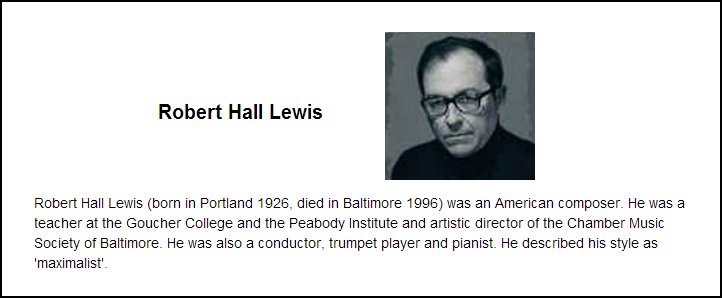

|
A life devoid of mediocrity
Appreciation: Legacy of Robert Hall Lewis, teacher,
music-supporter and great composer,
includes works unmatched in refinement, sophistication, richness of texture and inventiveness. March 28, 1996|By Gordon C. Cyr, SPECIAL TO THE BALTIMORE SUN The eminent composer Robert Hall Lewis died last Friday, just before his 70th birthday and barely a year into his retirement from Goucher College and the Peabody Institute. He is survived by his wife, Barbara, and his daughter, Renata. He is survived as well by his beautiful music: more than 70 orchestral works, including four symphonies and innumerable chamber works. Especially noteworthy among the latter are four string quartets, the last two of which are intense, highly concentrated examples of some of the best work in that medium done in our time. But Bob, as he was known to friends and colleagues alike, was a lot more than a fine composer, although that fact alone would ensure a high place in the music-world's regard. He was also supportive of the cause of new music in the greater Baltimore musical community. Bob was an excellent conductor, and not only of his own music, in which he led assorted London ensembles for two compact digital discs of his works, but of difficult works by other contemporary composers as well. Bob was an exemplary teacher, as his students would attest. He held his charges to the strictest standards -- standards to which he held himself most of all. His vast knowledge and experience of orchestration alone served his students well; many have achieved prominence in the musical world. One of Bob's many values to the musical community was as a "gadfly." One might describe him as the "town scold." He deplored mediocrity and compromised standards, and he railed eternally against the temporizing repertory choices of performing and presenting institutions. Still, he was successful in gaining performances of his music in several notable venues, including the Baltimore Symphony Orchestra and the American Composers Orchestra. For many years, Bob was the music director of the Chamber Music Society of Baltimore, a presenter of chamber music with emphasis on the living composer. The distinction of the society's programs owes everything to Bob's stewardship, and it will be a hard task to find someone to fill his now empty shoes. It will be difficult as well to find another "gadfly," and especially one whose criticism was tempered with an abiding love of music and extreme goodwill toward his colleagues and students whose efforts he so generously supported. It is as a composer, however, that Bob Lewis is simply irreplaceable. There is no other music like his -- in refinement, sophistication, richness of texture and inventiveness. The over-riding description is "beautiful," and beyond that, words are wanting. If it were not for the over-production of composers today, if it were not for the vast publicity machines garnered by them for self-promotion, if it were not that performing institutions by and large refuse to take risks in their selection of new music, if it were not that the music industry in this country is geared to the promotion of "stars," then Bob would be recognized for the great composer that he was. But Bob was too busy creating music to bother himself with these things. When he was not writing music, he was supporting that of others. For all these things he will be sorely missed -- by his family, his friends, his colleagues and his students. The musical community -- and the music world -- has lost a true friend. [Gordon C. Cyr is a composer and Professor Emeritus of Music Theory and Composition at Towson State University. He is president of the Chamber Music Society of Baltimore.] |
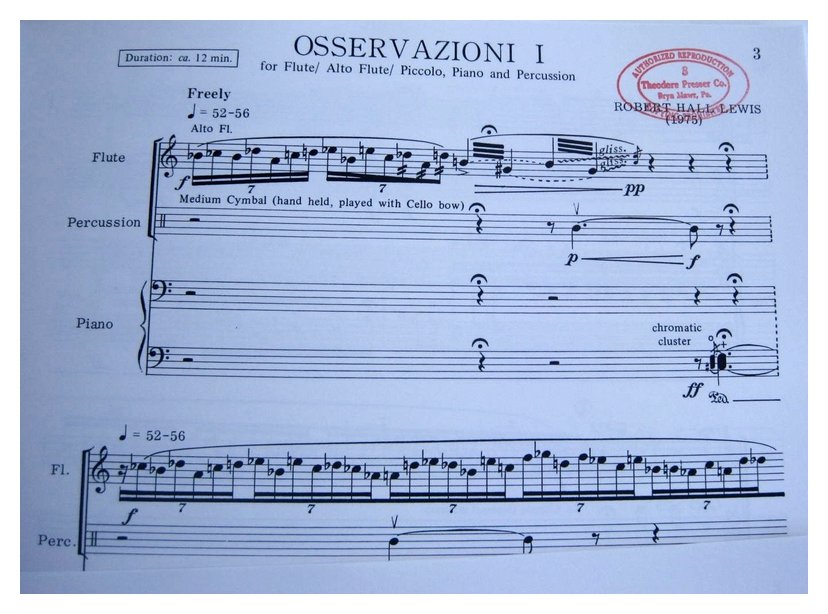
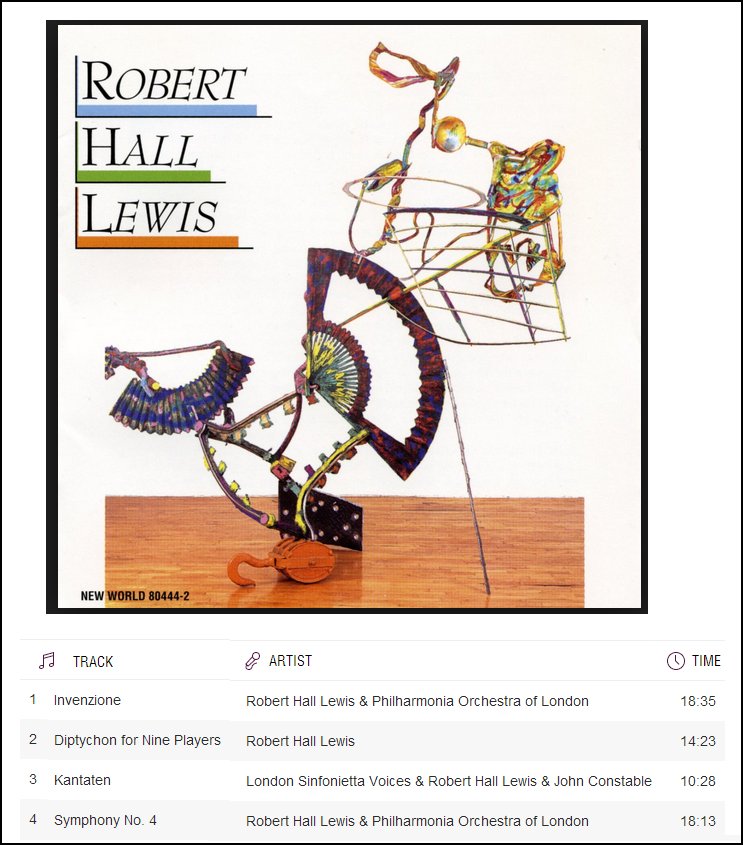 Robert Hall Lewis: In general, yes. Naturally
there are the disappointing periods when perhaps the reception is not as
desirable as you would hope, and that the performance — or
the participation of the musicians — may not be as
enthusiastic as one would hope for. I would say I have about eighty
per cent positive record on that. The other twenty per cent would have
to be listed in the category of mildly disappointing. It depends upon
who is calling the shots. If you have a great orchestra and a great
conductor, this is probably going to be a very successful event
— assuming that the piece is good. It’s an assumption that
you cannot always make because many times one will hear a piece
— at least a composer in judging another composer’s work
— and consider it not to be such a fine work.
Robert Hall Lewis: In general, yes. Naturally
there are the disappointing periods when perhaps the reception is not as
desirable as you would hope, and that the performance — or
the participation of the musicians — may not be as
enthusiastic as one would hope for. I would say I have about eighty
per cent positive record on that. The other twenty per cent would have
to be listed in the category of mildly disappointing. It depends upon
who is calling the shots. If you have a great orchestra and a great
conductor, this is probably going to be a very successful event
— assuming that the piece is good. It’s an assumption that
you cannot always make because many times one will hear a piece
— at least a composer in judging another composer’s work
— and consider it not to be such a fine work.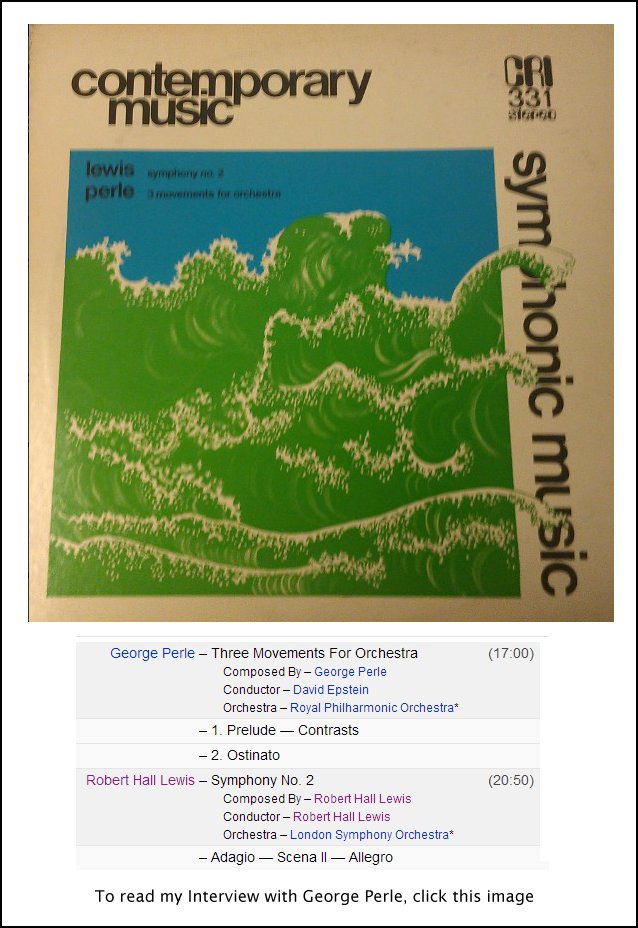 BD:
Your pieces are performed on concerts of twentieth century music, and also
on mixed concerts where there’s old music and new music. Do you have
a preference, one over the other?
BD:
Your pieces are performed on concerts of twentieth century music, and also
on mixed concerts where there’s old music and new music. Do you have
a preference, one over the other?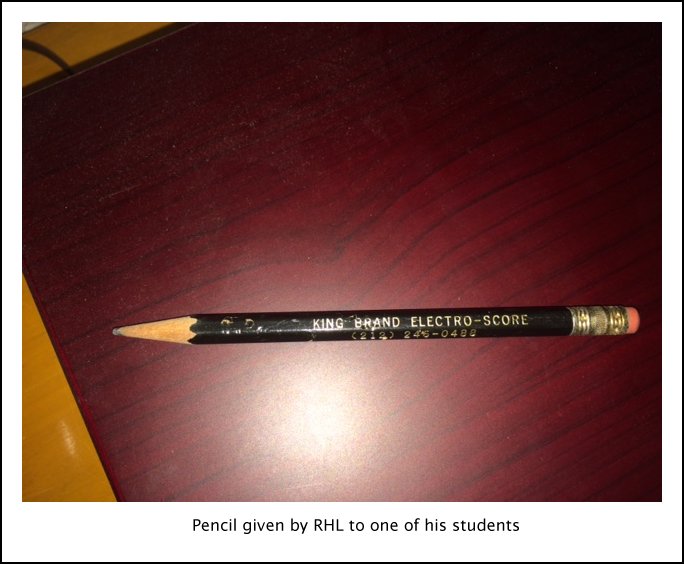 BD:
It’s nice that you do know what you can handle, and you can handle what you
have accepted.
BD:
It’s nice that you do know what you can handle, and you can handle what you
have accepted.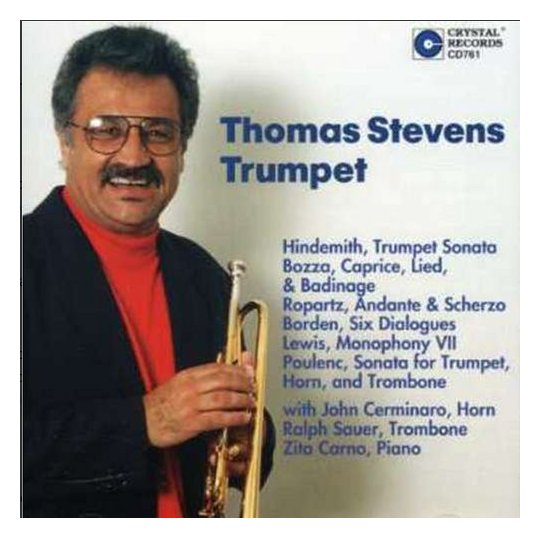 BD:
You brought up the fact that you’re teaching at two different institutions
as well as composing. Do you get enough time to compose?
BD:
You brought up the fact that you’re teaching at two different institutions
as well as composing. Do you get enough time to compose?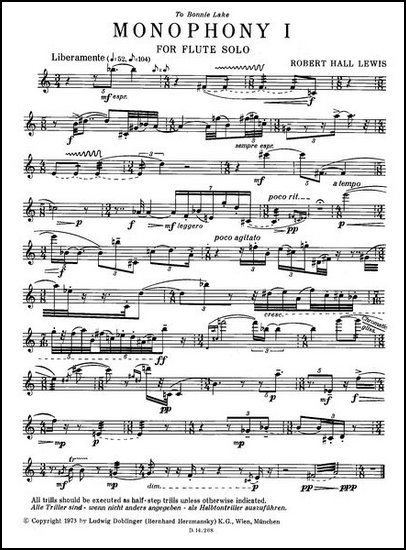 RHL: There are two viewpoints here. Some people
say it cannot be, and others, such as I, say one can teach up to a fairly
large degree. It is apparent that if a person is totally untalented,
then he’s going to have a very limited scope as far as what you can do with
him. But there are methods and concepts. There are some basic
techniques that almost any reasonably creative musical person could take,
and once you give those to the student, then their own talent, their own personality,
their own moods and emotions have to take hold. That drives them in
the direction of an individual style, and with that they may go or they
may not. But I do believe you can train the ear, you can train the
mind, you can train the eye. There are various things you can do to
get a person on the road. From there on, it’s a question of really how
much ability they have, and whether can they sustain the kind of momentum
you’re trying to give them.
RHL: There are two viewpoints here. Some people
say it cannot be, and others, such as I, say one can teach up to a fairly
large degree. It is apparent that if a person is totally untalented,
then he’s going to have a very limited scope as far as what you can do with
him. But there are methods and concepts. There are some basic
techniques that almost any reasonably creative musical person could take,
and once you give those to the student, then their own talent, their own personality,
their own moods and emotions have to take hold. That drives them in
the direction of an individual style, and with that they may go or they
may not. But I do believe you can train the ear, you can train the
mind, you can train the eye. There are various things you can do to
get a person on the road. From there on, it’s a question of really how
much ability they have, and whether can they sustain the kind of momentum
you’re trying to give them.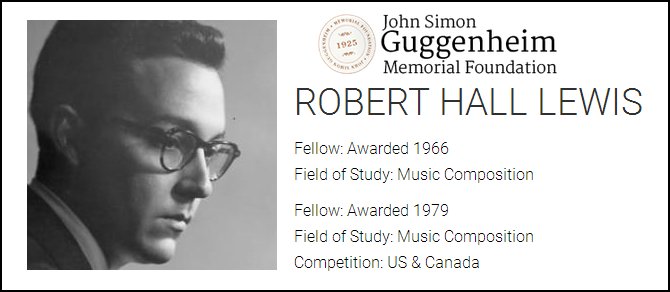 RHL: Many of these people who may be getting these opportunities
don’t really merit them in terms of their own creative development.
If you’re a violin teacher, just don’t want to put the youngest violinist
you have on stage to show him off. He’s got to play in tune, he’s got
to play the correct rhythms, and he must play in the correct style and manner.
The bowing arm has to be great, and everything has to be right if you’re going
to risk a fine violinist on stage. But in many instances, the development
of the composer may not be commensurate to that of the singer or violinist.
Other musicians will show their distinct flaws to everyone involved, whereas
a composer might be very mature and yet have technical flaws, but people,
in many instances, would not know the difference. It’s a question of
a composition sometimes going over, whereas performances will not go over
if they’re inferior. We don’t need to assume that everyone who is composing
music these days is writing something of a superior character. In fact,
that would be a very, very false belief. There’s lots of inferior music
being written these days, and in many instances the people don’t know the
difference.
RHL: Many of these people who may be getting these opportunities
don’t really merit them in terms of their own creative development.
If you’re a violin teacher, just don’t want to put the youngest violinist
you have on stage to show him off. He’s got to play in tune, he’s got
to play the correct rhythms, and he must play in the correct style and manner.
The bowing arm has to be great, and everything has to be right if you’re going
to risk a fine violinist on stage. But in many instances, the development
of the composer may not be commensurate to that of the singer or violinist.
Other musicians will show their distinct flaws to everyone involved, whereas
a composer might be very mature and yet have technical flaws, but people,
in many instances, would not know the difference. It’s a question of
a composition sometimes going over, whereas performances will not go over
if they’re inferior. We don’t need to assume that everyone who is composing
music these days is writing something of a superior character. In fact,
that would be a very, very false belief. There’s lots of inferior music
being written these days, and in many instances the people don’t know the
difference.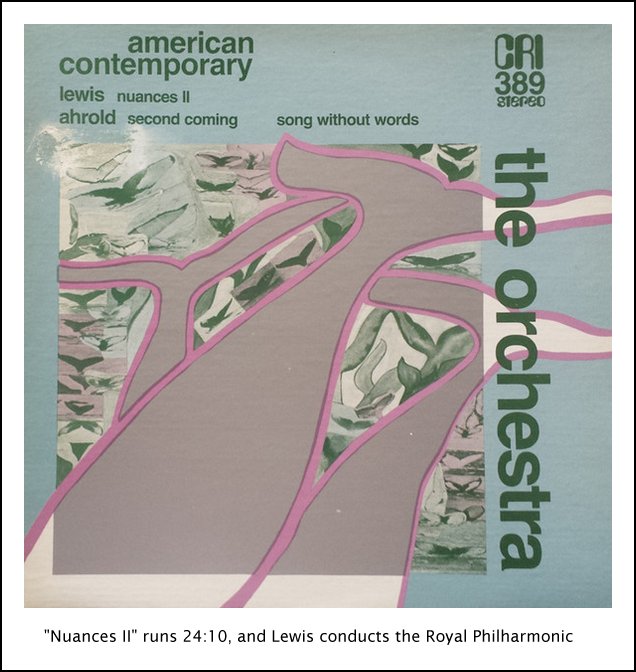 BD:
A number of your pieces have been recorded. Are you pleased with the
recordings that have been made of your music?
BD:
A number of your pieces have been recorded. Are you pleased with the
recordings that have been made of your music?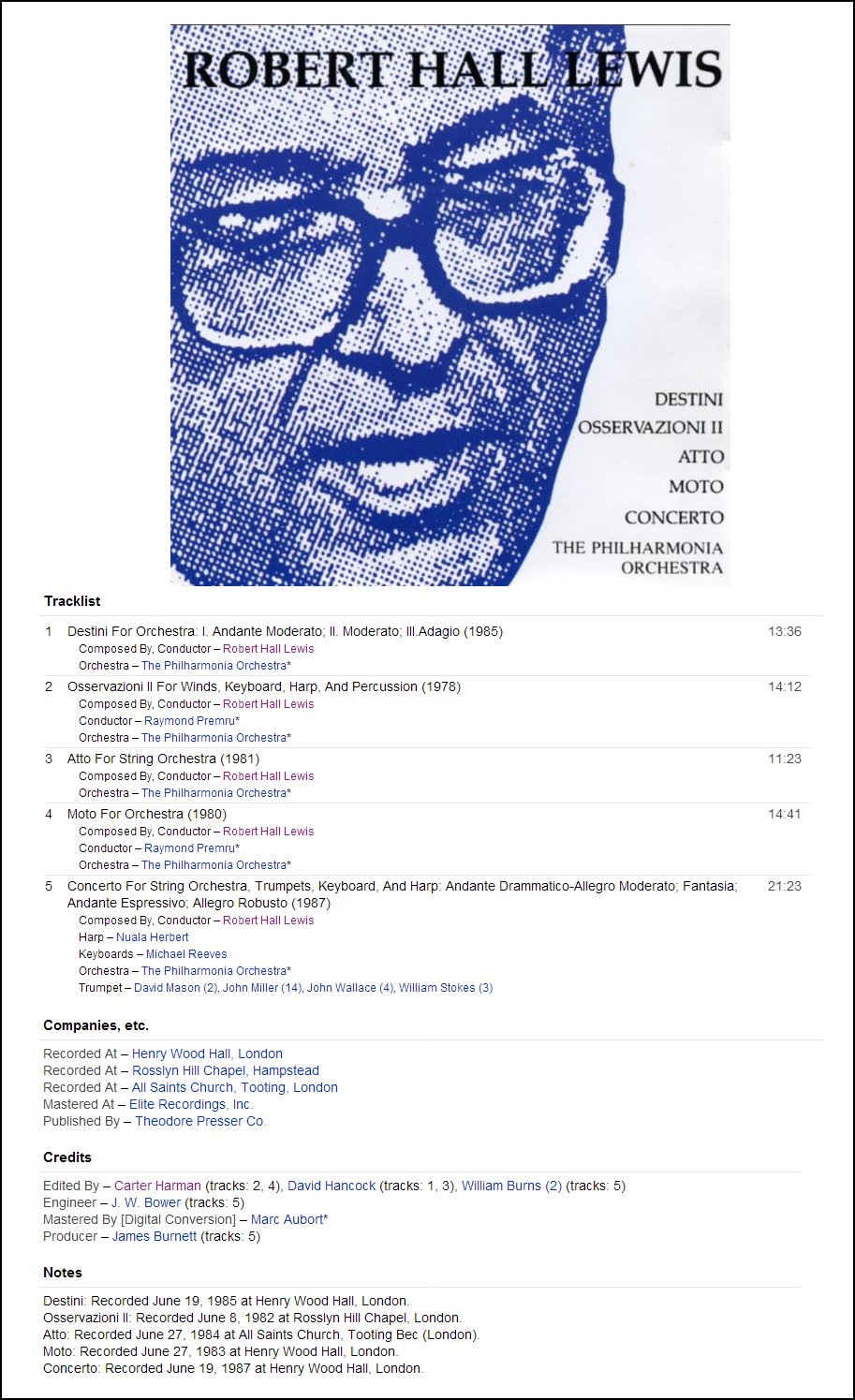
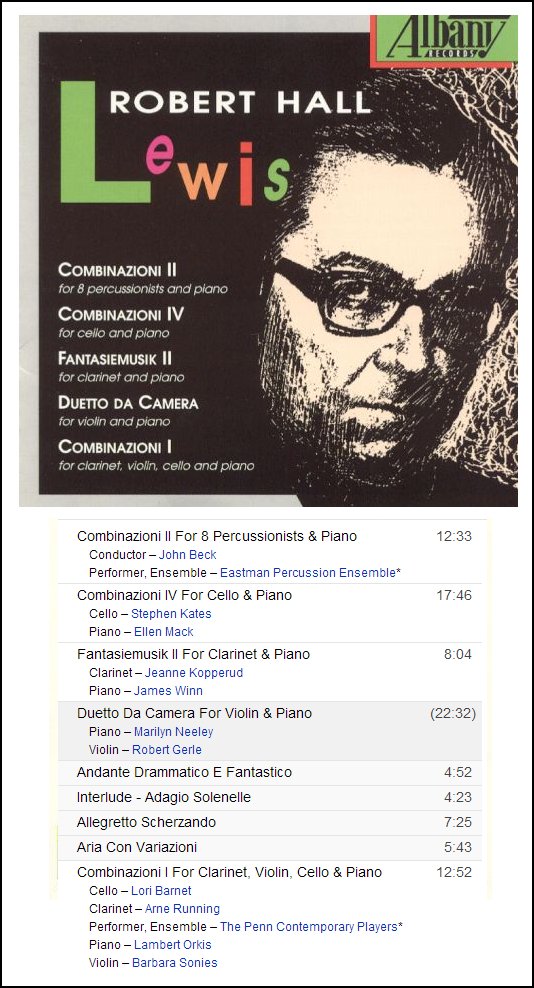 BD: Now you mention ‘keyboard’
several times. Are these regular keyboards or electronic keyboards?
BD: Now you mention ‘keyboard’
several times. Are these regular keyboards or electronic keyboards?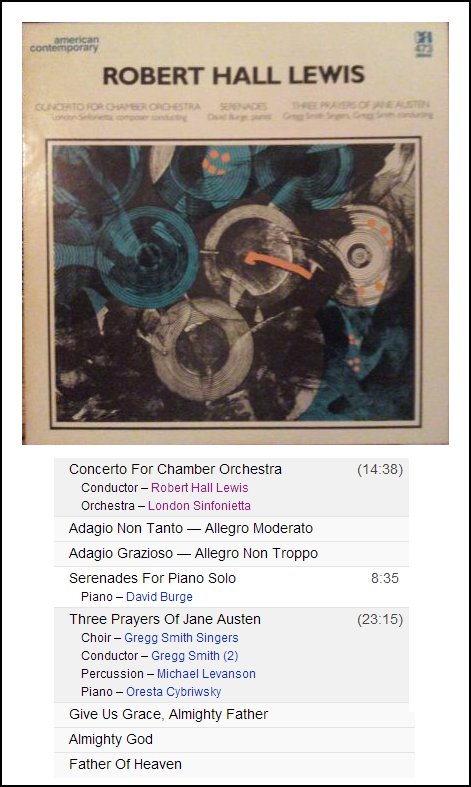 RHL: No, I am not looking for a pay-off, but at some
point there should be a pay-off of one kind or another for each work you produce.
Obviously something has to happen with it, but whether it’s a positive pay-off
or a negative is another matter.
RHL: No, I am not looking for a pay-off, but at some
point there should be a pay-off of one kind or another for each work you produce.
Obviously something has to happen with it, but whether it’s a positive pay-off
or a negative is another matter.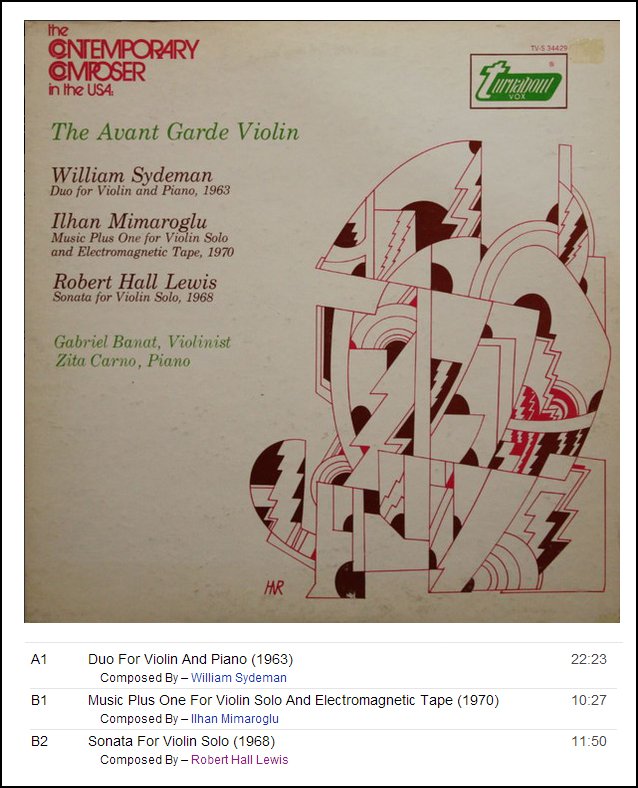 RHL: All other literature. The total literature
of music, going back to the mediaeval period. But, of course, much of
this is not accomplished until one goes to graduate school. We’re talking
now about graduate requirements, and these are broadening experiences.
The whole world of music history is therefore absorbed, and you get increased
insight by knowing these developments as they have come to us from the ninth
century on. Young composers should concentrate on getting a good clean
craft and technique, and develop an artistic integrity, and a good critical
sense. All of these things are not something that can be gained in
just a few years. This is the project of quite a number of years
of development and listening and observing and performing. The composer
after all should be a supreme musician. He should come into the art
by way of performing an instrument, perhaps singing in a chorus or playing
in an orchestra. He should have had fine training in that instrument
so as to develop his musical sensibilities. After all, one needs to
have a good sense of rhythm and a highly developed aural sense. The
ear is sensitized to sound quite well, and all of this comes through performance
and stimulation of the mind by listening and studying other music. But
again it’s something that takes a great deal of time. So what I would
say to young composers is simply if you think you have it, stick with it.
Do not be discouraged regardless of what happens, but don’t expect immediate
results until you really deserve them, and that means quite a few years of
preparation.
RHL: All other literature. The total literature
of music, going back to the mediaeval period. But, of course, much of
this is not accomplished until one goes to graduate school. We’re talking
now about graduate requirements, and these are broadening experiences.
The whole world of music history is therefore absorbed, and you get increased
insight by knowing these developments as they have come to us from the ninth
century on. Young composers should concentrate on getting a good clean
craft and technique, and develop an artistic integrity, and a good critical
sense. All of these things are not something that can be gained in
just a few years. This is the project of quite a number of years
of development and listening and observing and performing. The composer
after all should be a supreme musician. He should come into the art
by way of performing an instrument, perhaps singing in a chorus or playing
in an orchestra. He should have had fine training in that instrument
so as to develop his musical sensibilities. After all, one needs to
have a good sense of rhythm and a highly developed aural sense. The
ear is sensitized to sound quite well, and all of this comes through performance
and stimulation of the mind by listening and studying other music. But
again it’s something that takes a great deal of time. So what I would
say to young composers is simply if you think you have it, stick with it.
Do not be discouraged regardless of what happens, but don’t expect immediate
results until you really deserve them, and that means quite a few years of
preparation.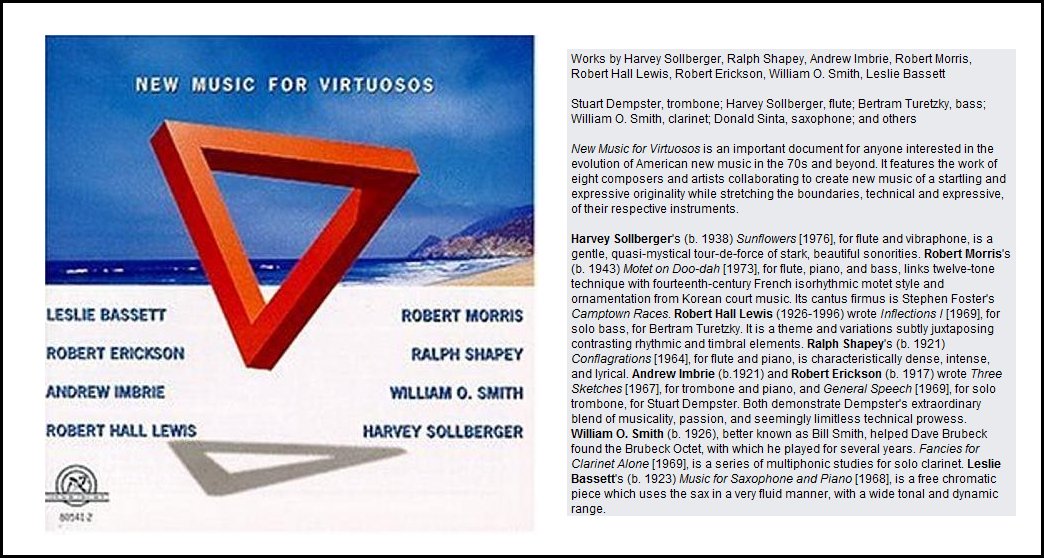
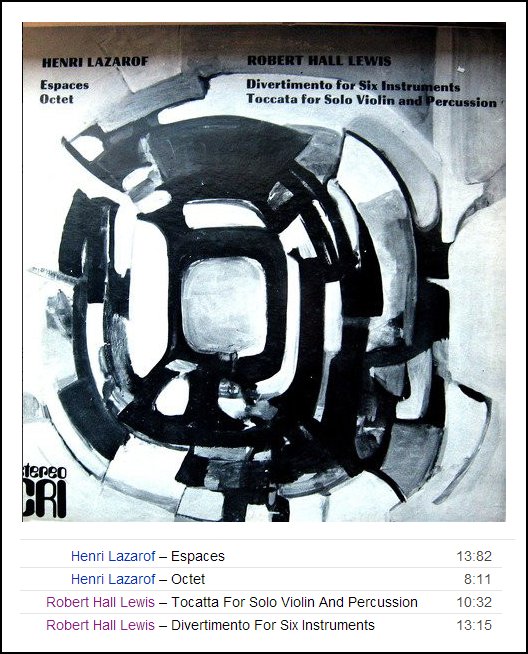
© 1990 Bruce Duffie
This conversation was recorded in Chicago on March 3, 1990. Portions were broadcast on WNIB the following year, and again in 1996. This transcription was made in 2017, and posted on this website at that time. My thanks to British soprano Una Barry for her help in preparing this website presentation.
To see a full list (with links) of interviews which have been transcribed and posted on this website, click here. To read my thoughts on editing these interviews for print, as well as a few other interesting observations, click here.
Award - winning broadcaster Bruce Duffie was with WNIB, Classical 97 in Chicago from 1975 until its final moment as a classical station in February of 2001. His interviews have also appeared in various magazines and journals since 1980, and he now continues his broadcast series on WNUR-FM, as well as on Contemporary Classical Internet Radio.
You are invited to visit his website for more information about his work, including selected transcripts of other interviews, plus a full list of his guests. He would also like to call your attention to the photos and information about his grandfather, who was a pioneer in the automotive field more than a century ago. You may also send him E-Mail with comments, questions and suggestions.